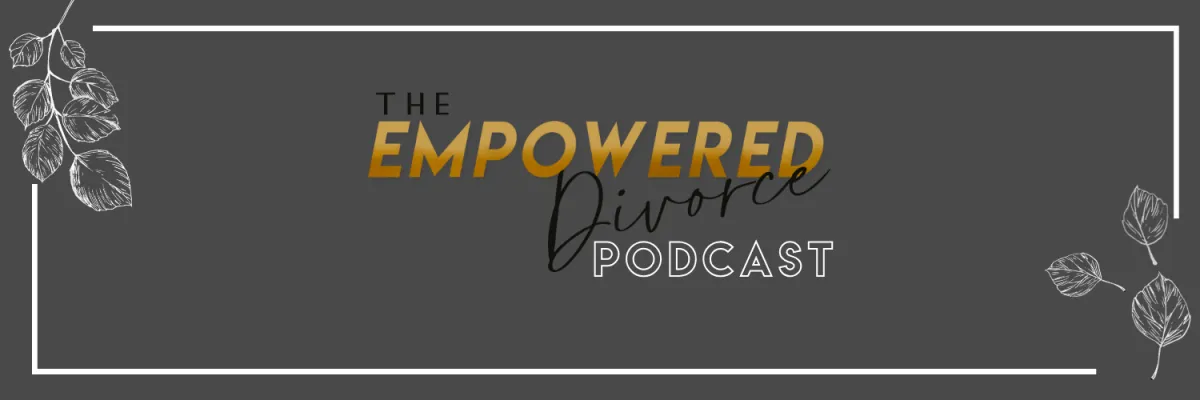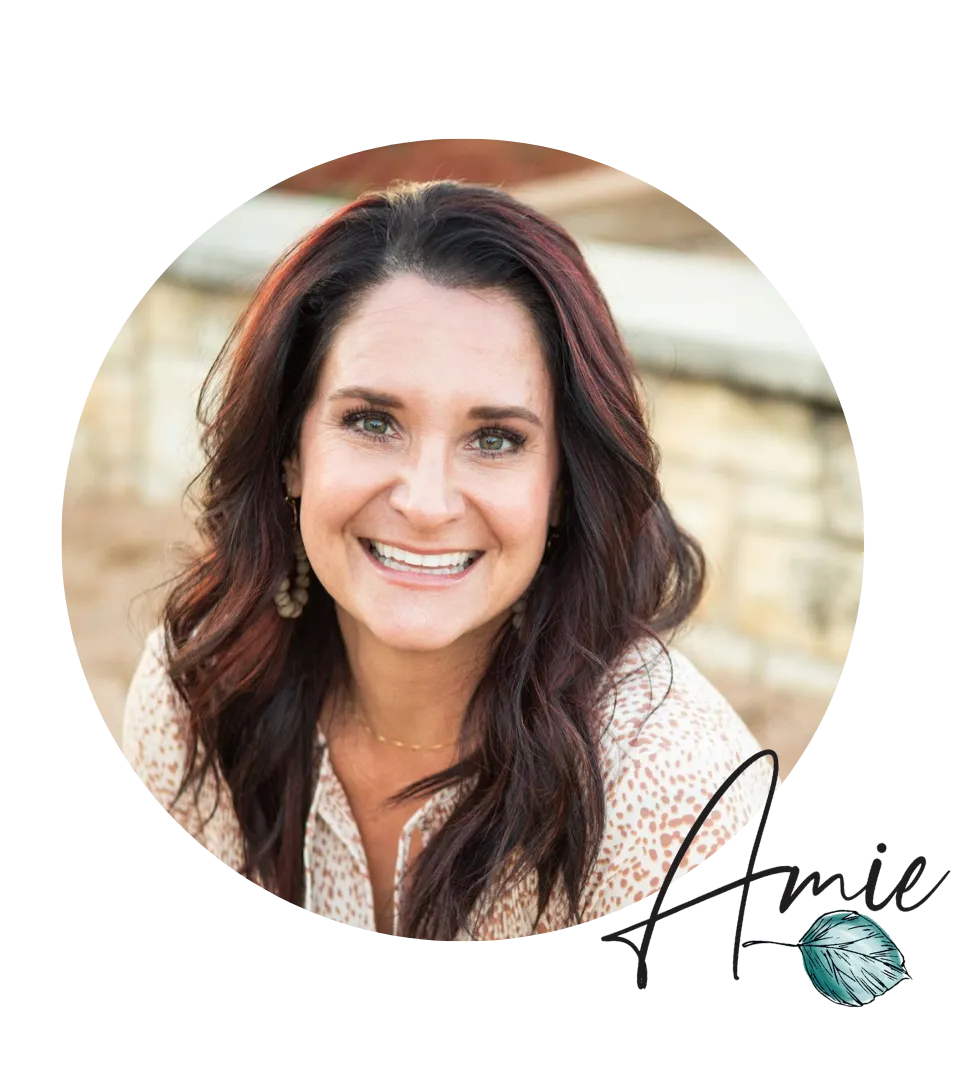
27. Grieving After Divorce: Healing From Betrayal Trauma, Abuse, and Divorce
What does it look like, how do you navigate it and how long will this last? Join me today as I share thoughts about grief, and how to process it in a healthy way that allows it to actually move through you. We can grieve empoweringly ( I created a new word) yes, you can allow grief to be an empowering experience IN the grief when you stop making yourself wrong for grieving, and when you stop thinking that you shouldn't be still grieving.
Grief can get stuck in our bodies and create more chronic pain when we stop actually feeling it.
I give you one tool to practice this week that can help you lean into grief where it's not so scary and also empowering as you validate your losses.
Read Full Transcript
Well, hello. Hello.
My amazing beautiful listeners.
Thank you for joining me today. How are you? I am hoping that those of you who are
experiencing grief right
now, or maybe you saw the title and
you're like, Ugh,
I don't want to look
at grief right now.
Wherever you're at.
It is safe to say that because divorce is a loss because of what you've experienced
in betrayal and abuse is
lost. You are grieving. Whether you see it or not, whether you want to or not.
And.
I want to just share a couple things.
And of course,
a tool that you can start practicing today
that will help
you process your grief
and move
towards it in a healthy way. I want to hold space today
for beautiful grief.
Yes.
Beautiful.
I'd
like to invite
you to consider
a different way perhaps to view grief after divorce
so that you can actually
benefit.
From grieving. Because when you do
lean into it
and accept it and
allow yourself to feel
it,
You'll
benefit because it will move
through you. If you don't, it will stay stuck in
you. And start
to manifest
in different ways. But
grief.
Is it very natural
human response
to loss.
or perceived
loss. Either way. It
is very, very important to the healing journey.
And a lot of us
run from it. Avoid
it.
Or make
it mean something about us intrinsically. For
example, I'm not strong enough, I'm weak. I'm not doing
as good
as I thought
when we
experience.
The intense emotions of
grief. And so hopefully after
today, we can
reframe some of those unhealthy messages, those
incorrect messages. There's a book on grief and grieving by Elizabeth
Kubler, Ross and David Kessler, which I love. And they've got such great thoughts
there on the griefs.
The stages of
grief.
The two of my favorites
that I
love coding all the
time is the first one by David
Kessler. He says your loss is the greatest loss. And the other thing I'm going to talk about today is my favorite quote that says
there is no correct
way or time to grieve.
So I want to share a few thoughts to help empower
you. Into this grieving
stage, the screaming
journey. I know, right? Like what.
You
mean move out of grief, right? Amy? Like, why are you making me step into grief? Well, first
of all, I'm not making you
do anything, but
definitely inviting, definitely encouraging. And hopefully with the thoughts I shared today,
It will
help. Kind
of create a little
bit of space, maybe between the thoughts that you currently have about your grief and about processing
it and feeling it.
That might be keeping you stuck. And allow you some
wiggle room to move towards it.
With a
different mindset.
Because when
you choose into
grief and accept
and make space for
it. Your body
will know what to do
with it. Like your
body was designed and created to know what to do with this grief. W and these emotions
when you actually.
Let it be there so you don't
have to worry or stress out over that part.
You have
enough to worry
about with choosing. Into
grief. Right.
Okay
first. Please, please, please, please.
No. That comparing losses. Your
loss to another person's loss. What you've
lost to what others have lost is not helpful. And we'll keep you from moving on. This is the
first point
I want to make today. Your experience is
yours. It's
real.
It's not to be measured against
anyone else's
And it will help you to accept
what you have
in fact lost. But
if you're busy ranking it and moralizing it or
comparing it. You are not seeing it for what it actually is.
I remember someone finding
out.
That I was
divorcing.
They didn't know, they were surprised. And so you get
the whole, you
know, Oh my
gosh, I can't believe it.
I never would
have guessed. He was so nice. Yeah.
Yeah, yeah. Go read about covert narcissism. Anyways. They found out I was divorcing and then made some comment. That
not only stung. But I felt. Some guilt
show up after this
comment. They said, wow, that
does sound really hard. And
then they threw out
this comment. Well,
at least it's not as bad as so-and-so's husband who died recently. And that was
just so sudden, and now she's
totally alone. Least, your
kids still get
a dad. Ah, Like,
Okay.
So ouch, because a
lady, you have no idea how
much loss I have felt where. Really
like a death of a loss. And
guilt. Because,
yes, my kids have
their father in their lives, but one that wasn't, in my opinion, healthier, stable.
So there's that. This is so not helpful for
others to do, but
especially for you to do to yourselves, you can't control what other people
say.
But letting those comments in letting those
comments. Have power.
Is not going to be helpful. So just bubble up those
comments and kick those thoughts out of your bubble when they come up, because they're, they're not going to help.
When you do that, you are moving away from your beautiful grief. Grief
is leaning into not running away from.
Grief comes when you make space
for it. And when
you're focused
on someone
else's grief.
Overshadowing
or. More deserving of grief,
then your experience, then you're not
open.
And then your body holds onto it. Stores it shoves
it. Puts it in different places. And then physiologically, it's going to show up in
some way. That's unhealthy and painful and a different
kind of pain weight.
Grief is not trying to change things or shift out of pain. It's leaning into the pain
and feeling
it in your body.
Okay. The second point around grief I
want to make
today is. There is no right way or right time to grief.
How many of you are saying. To you about your grief. Hey.
We
have to get over this. So let's just start feeling it. Let's get this done and get
this over with, or. We do not have
time for this. So let's stop feeling. Or
if I start feeling now,
I am never going to
stop crying. Never going to
get out of bed.
If I let myself feel anger.
Then I'm going to do something drastic.
First
of all. I know this feels very
true, but it's not.
Feeling. Is done in your body feelings happen in your body?
It's a very physiological
experience. Reacting is not to
feeling. So doing something
out of anger actually would
not be feeling
your anger.
And it's
important not to place a timetable or make this a checklist. The stages
of grief
are not linear.
There's not
this. Okay. Feel sad. Check. Okay. Feel angry.
Check done
with those
stages. And I know that that's
frustrating because a lot of us like checklists. Because it means there's an end.
When I
say is linear. And we're moving in and out and up and
down.
Ah, that's why
it feels like you're going crazy and where you can tell
your friend in the store at church
that,
that you run into who asks, Hey, how you
doing it in the moment you feel fine, but then.
20 minutes later, you're sobbing in the cereal aisle or the janitor's closet and the church building, which. At least there's toilet paper
in the janitor's closet. And I mean, I guess the inside of my t-shirt makes the good tissue as well, but. Anyways. I remember I was cleaning lady's house and listening to like,
Music, apple radio or something like that. And I was scrubbing
baseboards. And our song
came on the playlist. And so I was
triggered. I felt that loss, I
felt the pain and the
tears were just flowing down my face.
As I'm like wiping
these baseboards.
And I remember
thinking I can
not keep doing this. I can't keep crying at work. The
truth is I could.
It was actually
okay. When I
did have clients in the house while I was
cleaning. And I'd felt the emotions come up and
go in the bathrooms and
clean and turn
the water
on and cry.
I clean
move out
apartments where no one was there.
And I crank up
the anger songs and
get all my
swear words
out and scrub that
oven, soda and clean.
Get creative on how you can make
space for these emotions. Don't believe
your brain when it very quickly says, no, we
can't do this.
No, we can't feel this. No, we
don't have time.
Just doubt your brain. Just be like, I'm not sure. I believe you right now.
How can
we make space for this?
Sometimes I tell my
grief that I
needed to get to it later.
And
then. After putting
the kids to bed
before I did the laundry dishes,
bills, all that kind of stuff. I go in my closet floor
under the pile of laundry and hide and cry.
And guess what.
I stopped
at some point.
I didn't
cry forever.
And then I could go and do those other things that I
needed to do. Again, I know there's this thought
that comes, that says you're never going to
stop crying. You're never going to get out of
bed. You're never going to function.
But I
promise when you actually
choose into grief and feel
it in your body. Is it in my chest.
Counting the tears coming down your eyes.
Noticing if my hands are scrunched
or my toast scrunched,
I feel swirling
or turning in my stomach. Is there a lump in
my throat?
That is feeling it in your
body.
And then taking a deep breath in letting it
be there, letting
the tears fall.
I heard this once and
I stopped actually wiping the
tears away and I
let them fall and I counted them.
It tasted them.
I was with
that grief.
And not resisting.
We're shoving it down.
And guess what.
I did stop at some point and I could go do those things.
But I just remember thinking
that I want
all this intensity to go away.
I just want it all to go away so that I
can go back to
just being okay. But the truth about
trauma. Is, you'll never. Be the same. And grief is
showing up to make
you very aware of
this fact. It's
letting you know that
you are not that
same person.
Who thought your marriage was
sacred and her husband was being faithful.
Grief is letting you
know that your
hope of a future together. And as a family in one unit.
Isn't working out how you planned and it looks different
now. Grief is letting you know
that. Abuse is not okay. And it wasn't your
fault and you didn't know exactly what was happening. And so many boundaries and personal violations were made and you don't
have to accept it.
Grief is letting you know. That there really isn't anything that
you can do more of to change that person. Even though it feels like you could have, or should
have we're
supposed to. You can't. And accepting that.
That loss. Of control
is painful and hard to.
And grief is
letting you know.
So you're not the same. And yet
you do move on and move
forward,
creating something new. I've learned
from grief that I am. Strong and I am
a survivor. It's important to recognize when you're avoiding these feelings can sometimes be hidden behind going and
going and moving and moving and just
going so fast and doing
all the things that you feel like gotta do this. Gotta do that.
And
you're. And
now you're not
letting your body actually feel any of
it.
This coping
strategy will only last so
long. And at
some point, we'll either show up
in physical
ailments in the body, like auto-immune diseases, migraines, high
cortisol levels. Unbalanced hormones,
chronic pain. It will
manifest. And be in some way.
Very painful in a different way, whether you like it or not.
So leaning into this and
making space. We'll eliminate.
A
higher risk of side effects. If you
will. Does that make sense? So we're not
this isn't a, how do we get
rid of
pain and not be pain, pain as part of earth life? It's the 50 50.
But we don't have to step into
such high
risk
situations with our
body.
That bring
on these chronic ailments and chronic physical
pain.
So when you allow yourself to feel and process. Yeah, it's going to be
uncomfortable and it's requires
vulnerability. Many people, AKA.
Other
avoiders shovers and reactors. Can get uncomfortable
with those who feel their feelings.
You can just like, feel it in the air, right? If
you maybe you've experienced
this already, where.
You are leaning into more
of that vulnerability.
And you're sharing it with people
or you're sharing
an experience
or sharing that, you know what I'm really angry right now.
And this is
what I'm feeling in my body.
It's a lot of anger.
And that person who doesn't know how to be vulnerable with themselves.
It might have a response or a reaction to that.
And I just want you
to be prepared and know that it's
still doesn't mean you're doing
something wrong. Remember their response is reflected of reflective
of where they're at in their own journey
and in their own.
Holistic healing.
I had an experience at church
church when a man got up. To speak and was so vulnerable with his emotions and experiences
of doubting his faith and even being mad at God.
And you can like feel the silent gasps
in the congregation when he started sharing. And
like the energy just completely shifted
and me being very aware of
energy and others, I totally felt it. And I was sitting there. And I looked at
Scott.
And it was one of those looks where he's like, oh boy, what are you going to do? So I'm like, watch me now. So of course I
got up and after him and shared my feelings and thoughts, and I publicly thanked him for being
vulnerable. Even though it can cause
discomfort. And
that it is that
discomfort through that discomfort
that you discover your real power. And I said some other things too, and,
but I just had to get up and validate that brave man for doing
what many humans avoid doing and that's
feeling. And being vulnerable about it. Okay. So here's
one thing that
you can start
with. Start
practicing.
As you begin
your grieving journey, or maybe you feel
stuck in your grief, maybe you feel like, oh my gosh, I'm.
I'm still here.
Can you just pay attention to that thought right there? I'm still
grieving.
Notice
the judgment. With that thought.
Notice that there's this idea that you should
be somewhere else other than where you are.
Notice how that's
taking you out of the present. Which is taking
you out
of. Yourself, it's disconnecting from where you are. Taking
you out of self-compassion. If your thought is
still
here.
So I want to
challenge that thought. And if we're leaning into
an, a power
divorce, that means we need to
grieve and powerfully.
Yes, it's a
thing.
So
one thing that you can do, if you haven't
done, this is make a list of all the things that
you have lost
or perceived losses because of your experience. '
cause you listeners. Are not just divorcees. You are trauma survivors as well as abuse survivors,
And that
comes with a lot of loss too. So the first
step is to identify
and acknowledge
what those losses are in your life
and writing them out, gives them a
voice,
and it also gives
space to validate yourself. So that's what you
can do this week
for practice. And then
if you want to take it to
another.
Another step, another implement
another practice, be aware of your body, your physical body.
And the emotions
that are showing up.
Just throughout the day. Right. Denial,
anger, bargaining depression.
What stages coming
up in this moment?
Of
grief.
And how can I make space for
that? That part, that
experience.
If you are finding yourself in this episode, feeling like, oh my gosh, it
just feels too big, too
much. That's why I'm giving
you that one practice make a list of your losses is maybe all you need to lean into right now.
So that you are validating those experiences for yourself.
What this also does.
When you can write them
out. It's a lot like brain dump. Thought dumping that tool that I've offered before.
When you get your thoughts out on paper,
you can
S
you can create a little bit of
distance between
you and your thoughts and what that's.
Also doing is helping you.
Not identify with
the thought. Sometimes we believe that the thought is true it's fact and it's us.
And when you
can get it out on
paper and see it and, and see that, oh, this is what
my brain is offering me.
Then you're creating a little bit of space. And it's a
little bit of that time to go, huh?
Not me. That thought's not serving me or, Hmm. Interesting. Let me get more curious about that. It's that same concept that
I've shared before.
And that's what this list
will do for
you. Also, it's going to help
you write out those
losses and observe them.
And that's why I said. Right out the
things that you've lost and also perceived losses. There were many things that I felt like I lost.
But once I got
more curious about that, I
was like,
actually,
I
haven't really lost
that. So for example, I know I wanted to make this
short, but really
quickly. For example. I thought.
One of the thoughts that my brain offered me was
and those losses of grief with I
lost my family. I lost my family unit. It's gone. It's
destroyed. Okay.
And with that thought brought sadness an eight and anger, depression.
Okay. Grief.
But
when I had the experience of taking our first family
pictures, And
that was with my
family, my
Extended
family, my parents,
and all my siblings. I'm the oldest of seven.
So all of my siblings were married and had children. And my parents wanted to do
family pictures.
And so, Got my kids ready. We drove up to the house where the pictures were going to be taken. I get out. And immediately I felt the wave
Just pile onto me. It didn't help
that someone made a
comment about
my outfit,
which made me feel even more insecure. And I just thought, oh my
gosh. I can't do this. Because that thought
was.
I don't
have a family like everybody I
lost that.
Everyone else has. A spouse and kids and I don't. I've lost that.
And so hence
grief, right? So we go through the whole
pictures and yada, yada, we take my pictures and they fake smile and I go in the bathroom, my parents' house, and I
just saw, it was like, it was serious. It was miserable.
Well, weeks later after the pictures are being
done and the photographer
mailed
me my set of pictures.
And I
wasn't looking forward to them at all. Honestly. And I, and I quite honestly didn't expect them to get mailed to
me. I thought that they would go to my
parents. She'd throw it on the wall and there you go. That's going to replace
the picture of me and my
husband. And. That'll
satisfy you
and
now there's not going to be a hole in your wall space. Like that's
literally how I was thinking about it. Right.
But
they were sent to me. So I get it. I opened the envelope.
I pull
out this
beautiful picture. Of.
Me and my children.
And
immediately as I
looked at that picture, the first
thought was what a beautiful
family.
What a beautiful family.
And I was overcome by emotion and
I felt.
So much gratitude.
Four.
My new family unit.
My
new healthy
family unit.
So that loss that I originally felt I had loss of family. Was only perceived loss
because in
reality, I still have my family.
Me and my
children, we're a family.
And I probably put that
picture up on our wall.
posted it all
over social
media. So
that's why I say losses and perceived losses. And when you can get them out,
And start
getting curious about
them and question them and really look at is
that really a loss and how might that
not be a loss and how
can I, right.
Do you see where I'm going with this? You
can start to maybe eliminate some of
this grief that you can move through.
Because you can
see where
maybe.
What your brain is
telling you is a loss. Really? Isn't. And that's going to help you move
forward.
And this
grief move through your
grief. Is
as individual of
an experience as you are in this
And you are beautiful inside and out. And this experience of grief. Does
not change
So bravely empowering,
only
lean in.
Is that a word empowering? Only. I just made it up. It's a new word. Lean
in.
And start with just maybe
this one tool that I'm offering. And if you have any further questions about
this, please
feel free to email me and
reach out. So I can do another episode and answer your question on
it. Because every experience is individual. All right,
everyone. Thanks
for joining me. Take care. See you soon.







Facebook
Instagram
Youtube